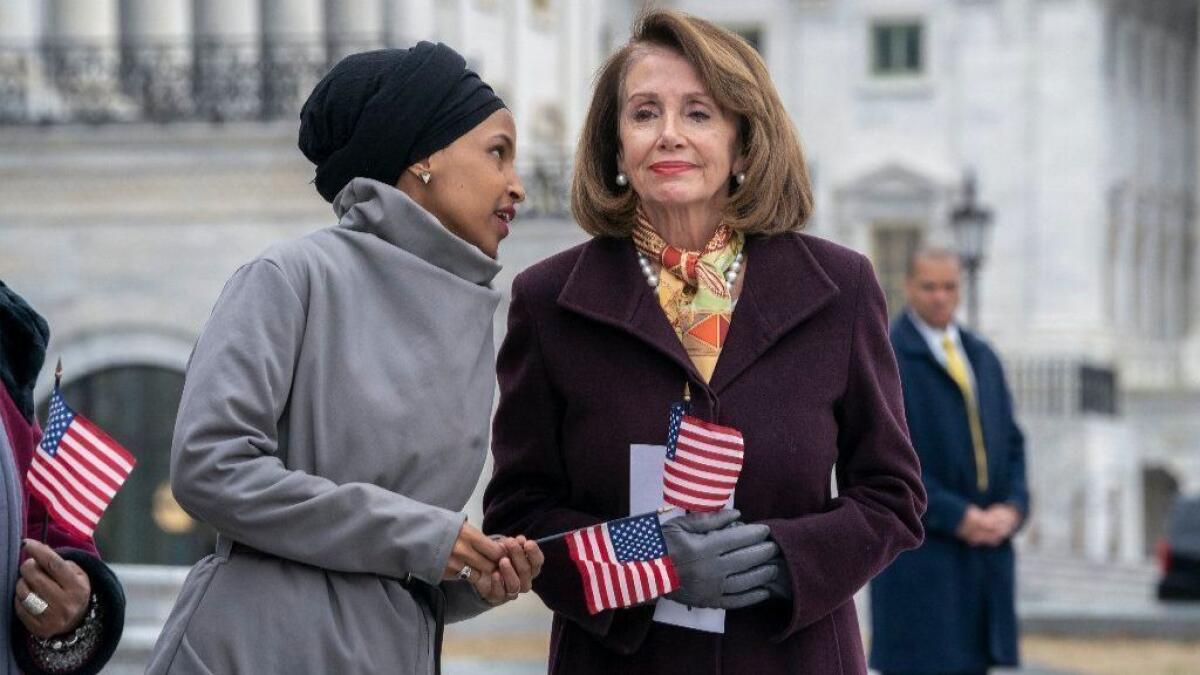Progressive Democrats hope the Omar clash will reset debate in Congress over Israel

As clumsy and offensive as Rep. Ilhan Omar’s remarks were when she questioned the patriotism of pro-Israel members of Congress, some Democratic lawmakers and left-leaning Mideast peace advocates say the episode could nevertheless open the door to a more robust debate about U.S. foreign policy and rekindle interest in the plight of Palestinians, particularly among younger Democrats.
“I think there will be more and more willingness on the part of members of Congress and policymakers to speak up and be critical of the policies of the U.S. and the government of Israel.… There’s been more reluctance in the past,” said Jeremy Ben-Ami, president of J Street, an advocacy group that supports Israel but opposes many of Prime Minister Benjamin Netanyahu’s policies.
Ben-Ami said that congressional newcomers like Omar (D-Minn.) — now one of three Muslim House members — and young Democratic voters are interested in exploring issues like the growth of Israeli settlements in the occupied West Bank, a topic that has been pushed aside as the Trump administration adopted a strong pro-Israel stance.
“They want to change the reality on the ground,” Ben-Ami said. “Ultimately they are worried about the impact of cutting off funds for schools. They are worried about the impact of violence and drinking water in Gaza. I think the space to have the discussions around that are opening up here.”
Others say that paints too rosy of a picture and worry that the political backlash against Omar from those within her party could end up stifling debate by making politicians afraid to discuss or even question U.S. policy on Israel. The widespread criticism of Omar could also make other lawmakers reluctant to side with her.
Aaron David Miller, a Middle East policy expert at the Woodrow Wilson International Center, said a strategy to change policy or even attitudes on Israel requires patiently building coalitions of lawmakers on Capitol Hill.
“My sense is that several of the progressive Democrats who have been most outspoken don’t have that kind of strategy,” he said. “These are perhaps genuinely held positions driven by emotion and ideology. But there isn’t a strategy behind it.”
The controversy also gave Republicans another political cudgel to use against Democrats, who have long been the favored party by far for American Jewish voters. President Trump last week outraged Democrats by calling them “anti-Jewish.”
But despite the internal Democratic Party battle triggered by Omar’s comments, progressives on Capitol Hill remain optimistic.
“This is a start of the conversation that didn’t happen in a positive way,” said Rep. Ro Khanna (D-Fremont). “But the conversation is not going away.”
Rep. Andre Carson (D-Ind.), a Muslim, agreed. “I think that it could spark a series of conversations that seek to address the Israeli-Palestinian question with more depth, more objectivity, more compassion, more readiness to have a dialogue that will foster greater relationships between Muslims, Jews, Christians, secularists and other faiths,” he said.
Though that could have been Omar’s goal, it didn’t come across that way to her peers. Omar said this month that pro-Israel advocates “push for allegiance to a foreign country” — a comment widely interpreted as questioning the loyalty of Jewish Americans and feeding into a long-held trope about Jewish people. It came weeks after she suggested that Americans who support Israel hold that position because of political donations from pro-Israel lobbyists, a comment for which she apologized.
Veteran Democrats immediately called for a resolution to condemn anti-Semitism. But other Democrats, many on them at the younger end of the Democratic caucus, launched a surprise revolt, questioning if the party was unfairly piling on a freshman Muslim lawmaker and creating a double standard by putting greater emphasis on anti-Semitism compared with other forms of bigotry, including Islamophobia and white nationalism. They demanded and won a broader resolution, which condemned virtually all forms of discrimination.
Even as most Democrats disavowed Omar’s comments, the debate led to a more open discussion on U.S. foreign policy.
When Rep. Juan Vargas (D-San Diego) said “questioning support for the U.S.-Israel relationship is unacceptable,” Rep. Alexandria Ocasio-Cortez (D-N.Y.), a high-profile freshman, balked. She compared such blanket statements of support to the kind of uncritical thinking that led the U.S. into war in Iraq.
“I‘m curious if Rep. Vargas will further explain his stance here that it’s unacceptable to even *question* US foreign policy,” Ocasio-Cortez tweeted.
But Democrats also hope the Omar controversy will serve as a lesson to ensure future debate is respectful.“This made it very clear that people can take whatever domestic or foreign policy positions they want, but we don’t impute motives to our colleagues based on racial, religious or ethnic stereotypes or tropes or superstitions,” said Rep. Jamie Raskin (D-Md.).
When Omar apologized for her comments suggesting support for Israel was based on money, she insisted she never intended to repeat anti-Semitic tropes. But she has also said she hopes to shake up the debate because that’s the way to make change.
“I know what my mission is. I know what my purpose is,” she told a gathering of supporters several weeks ago. “I know that as long as I breathe that I will continue to make people uncomfortable in the best way possible.”
Israel is likely to bubble back to the surface within weeks. In addition to the Israeli election next month in which Netantayu is trailing in some polls, AIPAC, the powerful pro-Israel advocacy organization that has been the target of some of Omar’s prior comments, is hosting its conference in Washington later this month. Netanyahu is slated to speak at the gathering and could meet with Trump while he is in town.
That could make it harder to avoid a debate over Israel.
“There’s a divide on the policies being pursued by the state of Israel under Benjamin Netanyahu and people are asking questions,” said James Zogby, head of the Arab American Institute, which advocates for Arab Americans. “Maybe the last place on Earth where the question is being asked is in Congress. But they’re not going to be able to escape it any longer.”
More stories from Jennifer Haberkorn »
More to Read
Get the L.A. Times Politics newsletter
Deeply reported insights into legislation, politics and policy from Sacramento, Washington and beyond. In your inbox three times per week.
You may occasionally receive promotional content from the Los Angeles Times.







